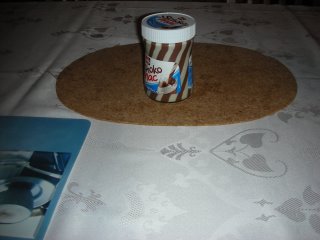
There it was: The glass of Nutella, just sitting there on the breakfast table.
Nutella is a creamy, chocolatey, nutty breakfast spread that is very popular in Germany and is becoming more and more popular in other parts of the world as well. It comes in a hundred different brands and flavors (This particular jar is a different brand and thus not officially Nutella, which is a trade-marked brand, but still I call it that.)
 Seeing it there on the table was a clear sign that were would soon be a fight. A fight about aesthetics. That’s how things happen in these literary houses: All it takes is one little thing like a glass of Nutella to set us off and we’re at each other’s throats. This is how it happened:
Seeing it there on the table was a clear sign that were would soon be a fight. A fight about aesthetics. That’s how things happen in these literary houses: All it takes is one little thing like a glass of Nutella to set us off and we’re at each other’s throats. This is how it happened: Erica: Who eats Nutella around here? Isn’t that something that kids eat?
Eric: Oh my God, you just made me realize that there is more meaning in that glass of Nutella than there will ever be in a beautiful poem about a tree.
Katja: You filthy bastard, there you go disparaging the beauty of nature again, if you don’t take it back I’m going to pour this scalding coffee right in your face!
Kobus: You dirty dog! I’ve had enough of your disrespect for poetry. If you open your mouth one more time I’m going to ram this kitchen knife right into your gut!
 Eric: Just you try it, you literary wimps! I’ll show you that a glass of Nutella has more meaning than a whole book of poetry! Erica would never walk through the park and say something like that about a tree: “Oh, that kind of tree is for kids.” In the Middle Ages they did, of course: Trees, birds, weather all had meaning, a crane was a symbol for Jesus, everything had meaning, but today it’s no longer the case. We see the beauty of nature and we feel transcended, closer to God perhaps, but there is very little real meaning in it.
Eric: Just you try it, you literary wimps! I’ll show you that a glass of Nutella has more meaning than a whole book of poetry! Erica would never walk through the park and say something like that about a tree: “Oh, that kind of tree is for kids.” In the Middle Ages they did, of course: Trees, birds, weather all had meaning, a crane was a symbol for Jesus, everything had meaning, but today it’s no longer the case. We see the beauty of nature and we feel transcended, closer to God perhaps, but there is very little real meaning in it. This glass of Nutella on the other hand is full of meaning. It means childhood for most Germans, and because of that to see someone eating it makes him or her appear to be endearingly nostalgic for his/her childhood. For me, it says something specifically about German women: I have never met a German woman who doesn’t love Nutella despite all talk of diets and will secretly eat it with a spoon when no one is looking.
And there’s more: Nutella is a huge success in Germany and I think of it as a German food, but I believe – correct me if I’m wrong – that it was an Italian invention that didn’t quite work in Italy but became a big hit when exported to Germany. That’s a little piece of ironic globalism right there, and it tells you a lot about Europe, about the relationship between Germany and Italy, and about the German perspective on their own live and environment (Germans complain a lot about Americanization and hamburgers and Hollywood influencing their culture, but not many know that Nutella is from Italy).
So all this meaning is in that glass of Nutella. You can’t say that about any of the beautiful trees in the park, though you can devise a thousand ways to say the same thing over and over again: That a tree is beautiful. In fact, I would go one step further and say that glass of Nutella is of much higher cultural value to Germany than about 80% of all poems written in German.
Next time you’re in a non-German country, like, say, Poland, try this experiment: Go to a café and talk to a table with three or fours Poles sitting at it. Ask them: “Can you tell me who Lessing was? Who Heine was? What is ‘Der Mann ohne Eigenschaften’?” Then ask: “Can you tell me what a Mercedes is?” Clearly, products are just as important to German culture as “culture” is, in many cases more important.
Of course, the whole point of writing poems about a tree is that you can use the tree to create an analogy to some part of your own soul. You can’t do that with a glass of Nutella. It is so fraught with meaning of its own that it overpowers the poet and defeats him entirely.
 Kobus: That does it! Take this, you swine! Aaaargh!
Kobus: That does it! Take this, you swine! Aaaargh!That’s when things really heated up.
No comments:
Post a Comment